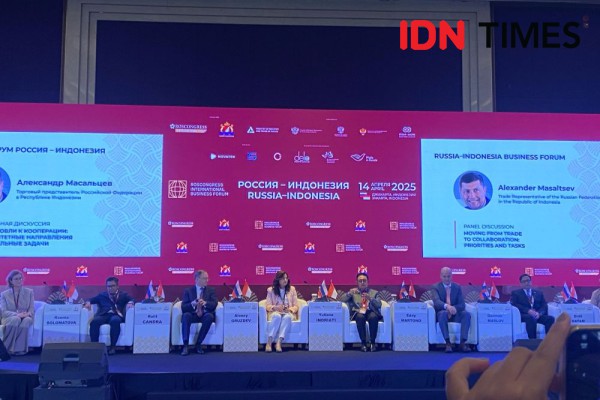The Indonesia-Russia economic cooperation is entering a new and promising chapter as both countries commit to expanding collaboration beyond traditional trade. Under the leadership of President Prabowo Subianto, Indonesia is actively pursuing stronger global partnerships.
A New Phase in Indonesia-Russia Economic Cooperation
Chairman of the Indonesian Chamber of Commerce and Industry’s (KADIN) Russia Committee, Didit Ratam, described the current momentum as “the beginning of a new economic operation” that could elevate both countries to a closer strategic partnership. He also highlighted Indonesia’s proactive approach under President Prabowo, citing its participation in forums like the Kazan Summit and quick entry into BRICS.
“These events mark the closeness of the relationship and the potential that can arise from it,” Didit said during the Russia-Indonesia Business Forum 2025 in Jakarta, as cited by Liputan6.com.
Indonesia is also anticipating the signing of a free trade deal with the Eurasian Economic Union within the coming months. This agreement could unlock greater market access and deepen bilateral ties.
Indonesia Prioritizes Food, Energy, and Water Security
President Prabowo’s administration has identified food, energy, and water as foundational pillars for development. Indonesia is currently opening two million hectares of new rice fields while cultivating hundreds of thousands of hectares for cocoa, coconut, and sugarcane. These efforts are backed by advanced technology, including drones for fertilization and heavy machinery for harvesting.
Didit noted that these agricultural developments create significant opportunities for cooperation with Russia. Indonesia aims to become a global hub for agricultural and food products, focusing on select commodities.
In energy, the country is committed to transitioning to clean energy sources and achieving net-zero emissions by 2060. Water resource management also remains a priority to ensure access and sustainability for the population.
Beyond Resources: Technology and Downstreaming Drive Growth
Indonesia continues to push for downstream development across various industries. While nickel remains a key focus, the government is also targeting bauxite, aluminum, and agricultural products like seaweed for value-added processing. These sectors offer promising investment potential for Russian partners.
In addition, digital transformation is on the agenda. According to Didit, “Digitalization should be aimed at increasing efficiency, not just following trends.” This pragmatic approach opens the door for meaningful tech partnerships that deliver tangible results.
Trust and Trade at the Heart of Indonesia Russia Economic CooperationFor Indonesia Russia economic cooperation to thrive, mutual trust and balanced trade are essential. Didit stressed that such collaboration cannot happen overnight. “We are still at the beginning. Today is the start. This is not the end,” he stated.
He also emphasized the need for reciprocal market access. “Russia should not only export to Indonesia, but also open up to Indonesian products,” he said. With a combined population of 430 million and a GDP of USD 3.1 trillion, both nations have the capacity to build a robust economic alliance.
New Horizons: Space as the Next Frontier
In addition to economic cooperation, Indonesia and Russia are now collaborating on space exploration. Russian Ambassador Sergei Tolchenov confirmed that discussions have begun with Indonesia’s National Research and Innovation Agency (BRIN). The partnership may include sending Indonesian cosmonauts to space and expanding the country’s satellite network with Russian technology.
“Our bilateral cooperation in the space sector is very promising,” Tolchenov told Russian news agency RIA Novosti, as reported by inews.id. “They are considering sending cosmonauts into space as well as expanding their satellite constellation with Russian technological assistance, including rocket science.” he added.
Roscosmos, Russia’s space agency, has also allocated scholarships for Indonesian students pursuing space studies. These initiatives reflect a shared ambition to explore new frontiers and foster long-term collaboration.
Looking Ahead: Evolving Cooperation for the Future
As both nations look to the future, the Indonesia-Russia economic cooperation is poised to deepen further across strategic sectors. With trust as the foundation and innovation as the driver, both countries are aligning their economic visions.
The collaborative efforts span agriculture, clean energy, technology, and even outer space exploration. These developments reflect more than just policy alignment, they indicate a mutual commitment to sustainable, long-term growth.
As engagement continues to expand, the partnership holds strong potential to shape regional dynamics and global influence alike.
Source: liputan6.com, rri.co.id, inews.id
Image: IDN Times/Marcheilla Ariesta


